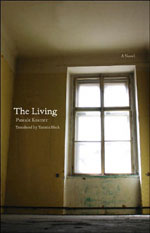| |
2000s |
| |
After Dark, Haruki Murakami
The Amazing Adventures of Kavalier & Clay, Michael Chabon
Asterios Polyp, David Mazzucchelli
Atonement, Ian McEwan
August: Osage County, Tracy Letts
The Book of Revelation, Rupert Thomson
The Corrections, Jonathan Franzen
Chronicles Volume One, Bob Dylan
The Devil in the White City: Murder, Magic and Madness at the Fair That Changed America, Erik Larson
Empire Falls, Richard Russo
A Fraction of the Whole, Steve Toltz
The Gum Thief, Douglas Coupland
A Heartbreaking Work of Staggering Genius, Dave Eggers
The Inheritance of Loss, Kiran Desai
The Inner Circle, T.C. Boyle
The Living, Pascale Kramer
Love in Infant Monkeys, Lydia Millet
The Monsters of Templeton, Lauren Groff
On Chesil Beach, Ian McEwan
Prodigal Summer, Barbara Kingsolver
The Secret Scripture, Sebastian Barry
The Story of Edgar Sawtelle, David Wroblewski
The Tender Bar, J.R. Moehringer
The Year of Magical Thinking, Joan Didion
Then We Came to the End, Joshua Ferris
Veronica, Mary Gaitskill
Zeitoun, Dave Eggers |
|
|
The Living, Pascale Kramer
Les Vivantsde, Editions Calmann-Lévy, 2001 (Switzerland)
University of Nebraska Press, 2000, (US), December 1, 2007, Translated by Tamsin Black
The ghosts of summer hover over a gorge of winter potholes and salty sediment-covered streets. The gaze of the phantom is eternal, never straying too far from the playgrounds of youth. And yet, the shadows will never again reveal the faces or thousand smiles. The spirit world is an abandoned town in which the living are forced to come to terms with voids that are forever.
The phone rings in the dead of morning. Was it the vicinity of 5 A.M.? Shock shoots through from the other end of the line like the whiz of a bullet. The bullet. It takes mere seconds (less) as if the distance traveled by this weary apologetic voice or the truth which lies in its incomprehensible offering is absolutely nothing at all. That the duration of half a heartbeat is all it takes for the world to disintegrate seems unfathomable. And yet, here we are, both of us zombies now, reduced to a fog of shock that is the only defense left in a suddenly depleted arsenal.
His eyes and mouth were full of tears, but though his body hurt, his mind still felt nothing, as though he had been stunned or stupefied by the enormity of what had just happened.
Time cannot heal. Furthermore, it reveals, little by little, all that was blocked by confusion’s initial blur. And as the months slide by with a pace reserved for canal barges, the shield begins to lose its strength. Holes appear. An unimaginable emptiness leaks through.
Benoît wondered what they would do during this shattered eternity that yawned before them, stunning them.
It starts with impossibly wide earthquake eyes, when suicide hotlines stop their ringing and the ominous quiet that settles over the smoldering dead air aftermath is as vacant as it is hopeless.
Benoît again had the impression that she was drowning in herself and that her words were bubbles rising miraculously up to them. He would have kissed her but for the gut fear he felt that she would start to cry.
Most shocking of all is the realization that the progression of grief can never be anything but absolute in its solitude. A desperately lonely road lies ahead. Despite the universal agony of bereavement, the connection to what is gone can be nothing but unique. That itself is perhaps the most difficult part of all (as if any of it can be quantified). No matter how much we surround ourselves with a semblance of a support system, we are ultimately alone in our tomb of the broken heart.
The idea that from now on it was every man for himself was starting to take root in him.
If you are one of the lucky ones, the hysteria of grief will fade in congruence with a hardening of your being. The knowledge that things will never be the same does not have to translate into a life sentence of imprisonment. Besides, who is not a sucker for suspense? There is really no other choice in the land of the living but to eventually get back to the days and their inevitable secrets. You walk on, this time more sympathetic to the plight of others who are not so lucky—the living who are now as dead as the object of their grief.
For me, I learned not to trust telephones, particularly when they decide to ring at such ungodly hours. This is my story, shared only by a ghost that remains painfully close, and yet forever just beyond my strained recognition.
-G

|
|
 |

